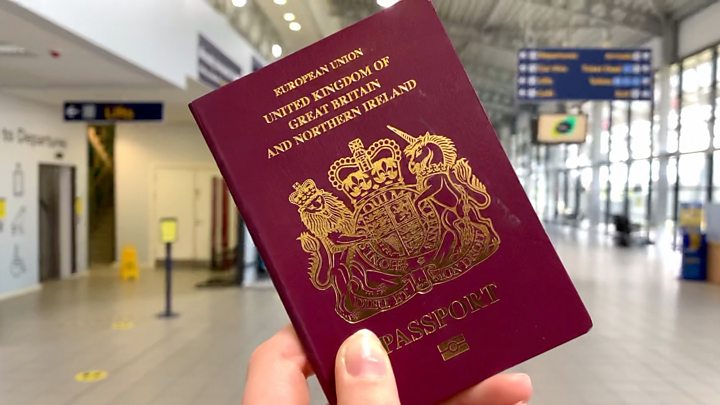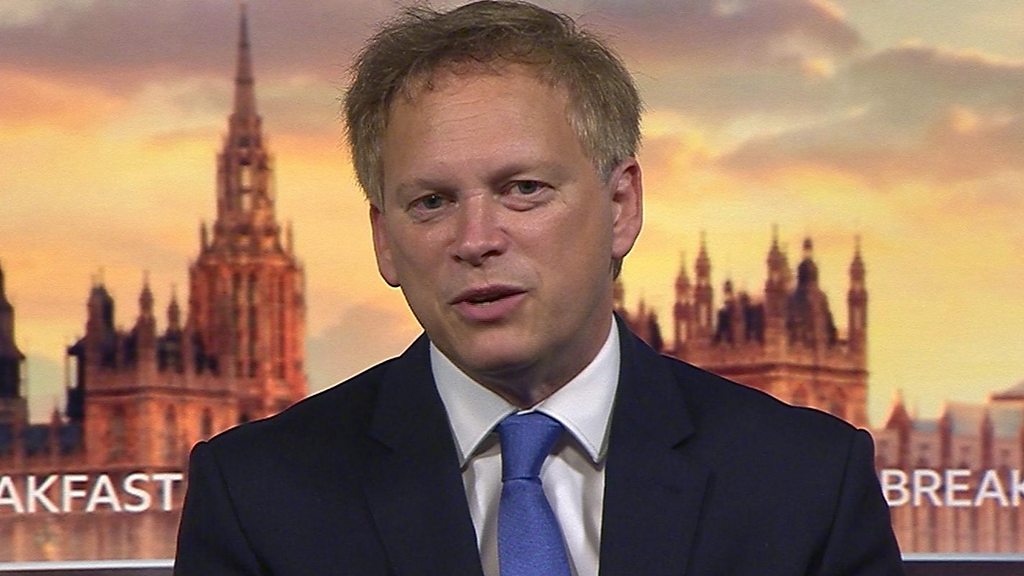
Media playback is unsupported on your device
Differences in UK quarantine rules are “confusing” for travellers, Grant Shapps has admitted, as the devolved nations take varying approaches to international travel.
The transport secretary acknowledged people’s frustrations, as Scotland and Wales asked arrivals from Portugal and parts of Greece to isolate, but England and Northern Ireland held off.
Wales’ rules, including only six Greek islands, began at 04:00 BST on Friday.
Travel firms called for urgent clarity.
Some holidaymakers from England say they have spent hundreds of pounds to avoid a quarantine that, for now, will not be in place.
While Wales’ advice has already changed, arrivals to Scotland from Portugal and French Polynesia will also have to self-isolate from 04:00 on Saturday. Scotland has already reintroduced quarantine for arrivals from Greece.
The measures will affect those who reside in Wales and Scotland but return to the UK via England.
Portugal, Greece and French Polynesia are still on England and Northern Ireland’s lists of travel corridors.
Mr Shapps told BBC Breakfast the difference in quarantine rules was similar to the way lockdown had been applied across the UK.
“It is similar, unfortunately, with the quarantining where we look at the data and then we do speak, but, I’m afraid, quite often come to slightly different outcomes, which I appreciate is confusing for people,” he said.
He described Portugal as being on a “borderline”, adding that “the opinion of England and Northern Ireland is that it did not justify quarantine this week”.
Mr Shapps told BBC Radio 4’s Today programme Scotland “sort of jumped the gun” by introducing restrictions for arrivals from the whole of Greece.
“I’m very keen and do try to coordinate… with the other administrations so we can both announce at the same time, and ideally both announce the same things, and this week that didn’t work out,” he said.
The seven-day infection rate in Portugal has increased from 15.3 to 23 per 100,000 people. This is above the threshold of 20 which is when the UK government generally considers triggering quarantine conditions.
Mr Shapps explained that cases per 100,000 people was just one measure taken into account by the UK’s Joint Biosecurity Centre, with the positivity rate of tests – which he said declined recently – also a factor.
But he warned: “As I constantly say… we will have to move quickly if the figures change.”
The latest quarantine rules introduced in Wales, which also apply to travellers from Gibraltar, affect six Greek islands:
- Crete
- Mykonos
- Zakynthos (or Zante)
- Lesvos
- Paros
- Antiparos
Welsh health minister Vaughan Gething told Today that Wales has seen 30 coronavirus cases from four different flights from Zakynthos, two of which landed in England.
“I did not feel that there was any course of action other than taking some form of action,” he said.
Scotland reintroduced self-isolation measures for arrivals from Greece earlier in the week, and has since added Portugal and French Polynesia to its list of countries requiring quarantine.
“This week’s data shows an increase in test positivity and cases per 100,000 in Portugal,” said Scottish justice minister Humza Yousaf.
Greece’s rate overall is below the 20 cases per 100,000 threshold, at 13.8 in the seven days to 2 September, down from 14.9 a week earlier.

Media playback is unsupported on your device
Northern Ireland will not make further changes to quarantine rules at present, its department of health said.
The variety of rules across the four UK nations has drawn criticism from industry experts and holidaymakers.
“The quarantine policy is in tatters,” said Paul Charles, chief executive of travel consultancy firm The PC Agency.
“Consumers are totally confused by the different approaches and it’s impossible to understand the government’s own criteria anymore on when to add or remove a country.”
In a normal year, more than two million Britons visit Portugal. Most head to the Algarve in the south, drawn by sunny Atlantic beaches, picturesque fishing villages and golf courses.
Some holidaymakers have told the BBC they paid as much as £1,000 for flights to get home from Portugal in anticipation of the rules changing.
Kelly, from Birmingham, and her family changed their flights home from the Algarve from Saturday to Friday at a cost of £900 to avoid potential quarantine because she did not want her children to miss out on two weeks of school.
The 45-year-old said the situation was “absolutely disgusting”.
“It’s cost us a lot more money and it’s money we didn’t need to spend now. We’ve lost an extra night in our villa – we won’t get that back – we’ve got a hire car, so we’re taking that back a day early.”
Damian Martin had switched his holiday destination from Spain to Lagos, Portugal, in a now failed bid to avoid having to quarantine.
“I will be able to self-isolate, I think, but I work for a supermarket so will have to check in with them,” he said.
“I’m supposed to be here eight nights. I might as well try to enjoy it.”
- SURVIVING THE VIRUS: My brother and Me
- GOOD TROUBLE: Your new drama obsession – can these girls make it in LA?
Are you currently on holiday in Portugal or Greece? Have you made plans to travel there? Share your thoughts by emailing haveyoursay@bbc.co.uk.
Please include a contact number if you are willing to speak to a BBC journalist. You can also get in touch in the following ways:
- WhatsApp: +44 7756 165803
- Tweet: @BBC_HaveYourSay
- Please read our terms & conditions and privacy policy
If you are reading this page and can’t see the form you will need to visit the mobile version of the BBC website to submit your question or comment or you can email us at HaveYourSay@bbc.co.uk. Please include your name, age and location with any submission.
